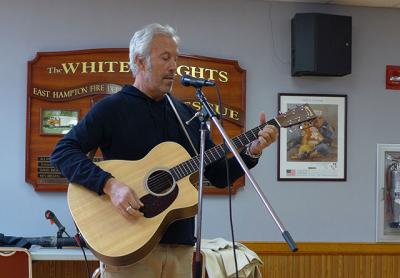A Wish for Music in East Hampton Village, in Song

Men and women in blue lined the back wall of the East Hampton Village Board meeting room on Friday to watch their colleague Sgt. Kevin Duchemin‚ who is retiring from the police force after 27 years‚ receive a proclamation honoring his service. Michael Tracey, the chief of the department, credited Sergeant Duchemin’s career success to the bonds he forged with the community and with fellow officers. “The testament to that is the showing that you see in the back of the room here,” Mr. Tracey said.
The hot topic of the meeting was the possible lifting of the ban on live music at village restaurants, while the good news came in a report showing that the village is in top financial position.
When Mayor Paul F. Rickenbach Jr. opened the floor to a discussion about the music ban, Paul Fried‚ who is ardently pro-live music (even of the amplified variety)‚ lugged a guitar, a microphone, and a small amplifier up to the podium and sang a few bars of the Neil Young song “Old Man.”
“I was trying to demonstrate that we’re not talking about rolling out a wall of Marshall amps; it’s not going to disturb anybody‚“ Mr. Fried said.
Steven Ringel, the executive director of the East Hampton Chamber of Commerce, told the board that the organization is in favor of lifting the ban. “I know that it will stimulate business. It will bring people into the village in the evening where they’re not now,” Mr. Ringel said, adding that businesses should be held responsible for music that is too loud.
Although at the last board meeting, Mayor Rickenbach had said that the members of the board “all agree that we don’t want to see amplification, period,” Arthur Graham, one of the village trustees, found some wiggle room. “I wouldn’t mind music inside with modest amplification as long as it was inaudible outside,” he said.
Mr. Graham was clearly in the minority, as his colleagues on the village board, Barbara Borsack, Richard Lawler, and Bruce Siska, voiced concern about quality of life issues that could arise. Mayor Rickenbach closed the discussion by saying that once the board got closer to crafting language for a possible new statute, the public would have ample opportunity to express opinion.
The report on the village’s 2017 financial audit shows that it had revenues of $22 million, which exceeded projections by almost $1.6 million for licenses, permits, fines, and state aid, which accounted for nearly 80 percent of the increase. The expenditures amounted to $19.6 million, which came in under expectations by almost $600,000.
As a result, the village was able to add $270,000 to the employee reserve fund, $300,000 to the capital reserve fund, and $1.6 million to the capital projects fund. The village now has an unassigned balance of almost $5.8 million, with roughly $6.3 million in unrestricted money.
“Congratulations,” Frank Sluter, an accountant from the firm that conducted the audit, said. The village “is in a very strong cash position [which] puts the village in a very good light.”
